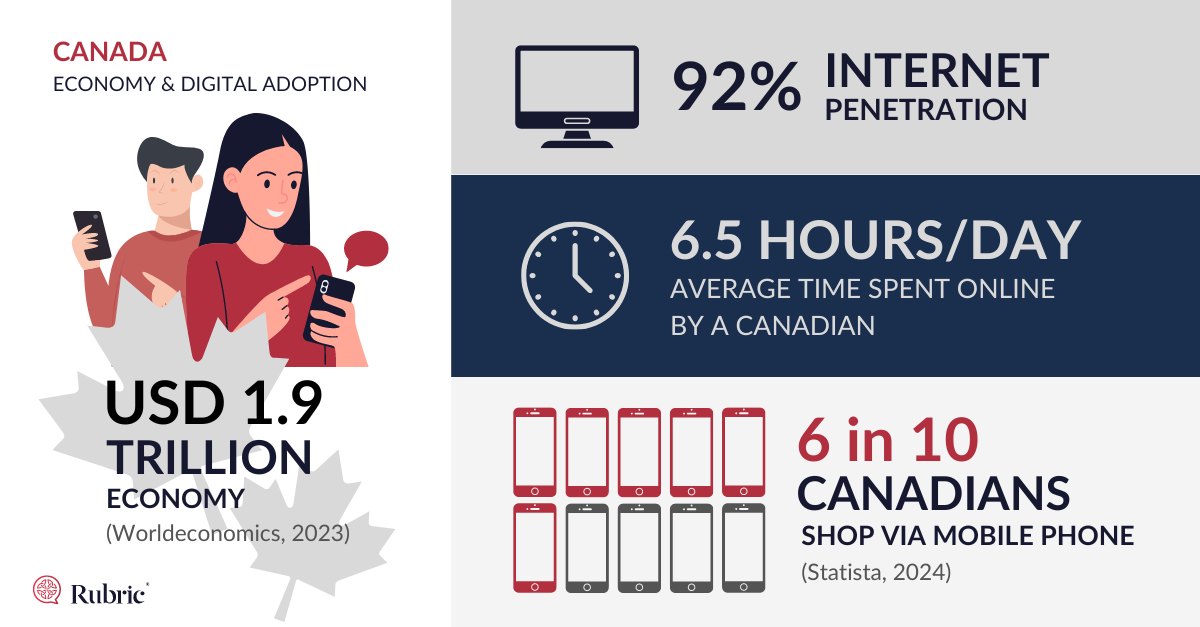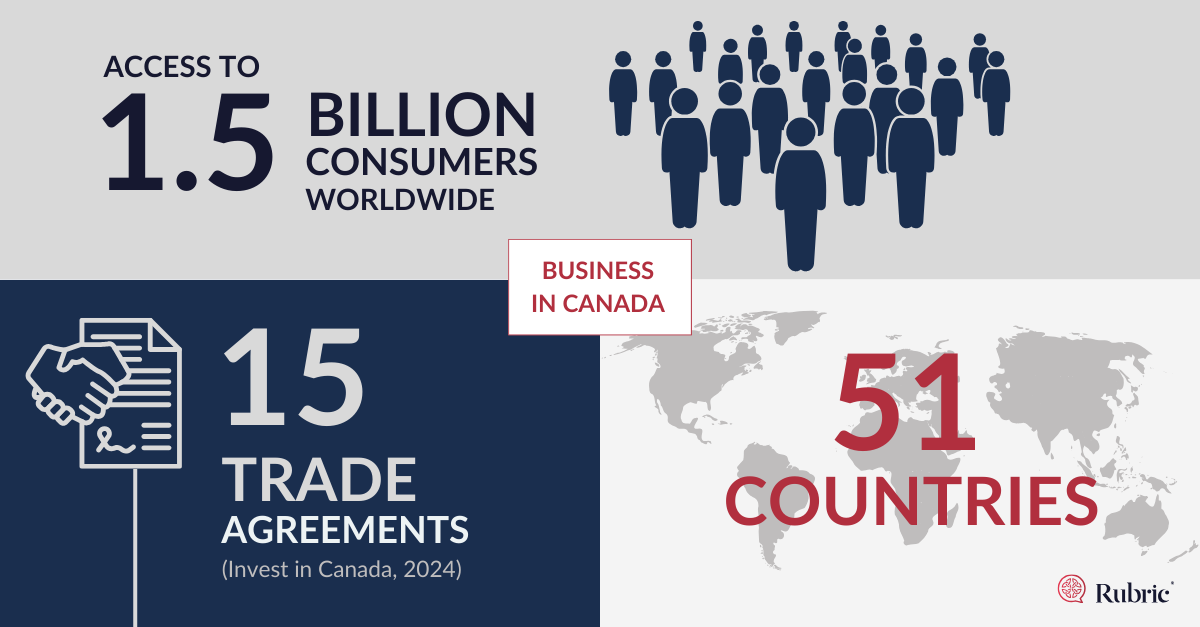
Are you thinking of expanding your business into Canada? This market guide will show you how to play your cards right.
Canada is a leading destination for companies looking to enter the North American market. Its proximity to and similarities with the United States are some of the factors that make it an attractive destination for business. Yet, being aware of some key differences between the two countries is important before diving in.
Let’s explore some factors that can help your business succeed in Canada.
Market overview: What you need to know about Canada
Canada is the world’s second-largest country, in terms of area, with a relatively small population of 38 million people. The Arctic Ocean, Atlantic Ocean, and Pacific Ocean give the country its enormously long coastline.
With Ottawa as its capital city, the country has a diverse, multicultural population and is known for its immigration-friendly regulations.
The major industries are agriculture and agri-based businesses along with a thriving manufacturing and service industry. The region is also rich in natural resources making the production and export of mineral, oils, and gas a valuable sector.
Digital adoption in Canada: GDP and demographics

Canada is a USD 1.9 trillion economy. Internet penetration in Canada is 92% and a large section of this population frequently uses the internet via their phone.
On average, a Canadian spends 6.5 hours per day online. Most of the time is spent on emails, followed by online banking and social media in that order. Facebook and Pinterest are the two most used social media platforms.
In addition to active social media usage, Canada has an active and growing e-commerce market.
What languages are spoken in Canada?
English and French are the two official languages in Canada. Approximately 23% percent of the population speaks French and the use of the language is particularly prominent in Quebec. It's important to be aware of the legal requirements associated with providing content in French when doing business in Canada to ensure you meet these requirements if they apply to your business. See the Compliance and regulations in Canada you should know about section.
For businesses trying to reach out to the French-speaking population here, it’s also important to know that Canadian French and its nuances can be different from the French spoken in Europe. Therefore, localizing with that in mind could be beneficial for businesses trying to enter this market.
5 compelling benefits to doing business in Canada
There are several advantages to doing business in Canada but here we will focus on 5 key ones:
1. Educated and diverse workforce
Not only does Canada have a highly educated workforce, but it also has a government that prioritizes continuous learning and skill-building programs.
The diversity in population also lends to a multicultural and diverse workforce which is great for global businesses looking to set themselves up in Canada.
2. Excellent infrastructure and connectivity
Canada has excellent infrastructure for trade and connectivity across the border with America and globally with its ports, airways, and road transportation. In 2016, the government also committed over USD 180 billion towards infrastructure development over 12 years.
The investment’s key focus areas include improved public connectivity and efficient transportation systems. It also focuses on innovation and implementation of green technology solutions.
3. Access to global markets

Canada is well positioned both geographically and economically to sell to global markets. Being a free and open economy, Canada provides easy access to international markets through its free trade agreements.
With fifteen free trade agreements, Canada allows access to 51 countries and 1.5 billion consumers across the globe.
4. Affordable corporate taxes
Another great advantage for businesses is the low corporate tax. The net corporate tax in Canada is lower than that of most Western countries due to policies that help reduce tax liabilities.
The net corporate tax rate stands at 15% after federal tax abatement and general tax reduction. The rate is much lower for Canadian-controlled private businesses.
5. Proximity to the United States
The United States and Canada share an extensive border along with trading ties and certain similarities in market characteristics. This relationship contributes significantly to job creation, exports, and investments in both regions.
Global businesses interested in the North American market can explore ways to capitalize on the ties between these two nations.
Compliance and regulations in Canada you should know about
The common law applies to the whole of Canada except Quebec which is governed by civil law (Civil Code of Quebec).
When it comes to language requirements in business operations and consumer interactions, the Charter of the French Language lists the various rights to be informed, served, and instructed in French. It is vital that your business understands and complies with this requirement, based on the nature of your business.
In terms of foreign investments, industries such as telecommunications, air transportation, and financial services, among others have certain restrictions. But Canada also provides grants and investment incentives in select industries.
Franchising legislation is different for different provinces. So, it is best to check the specific requirements of the province of interest before going ahead.
Businesses also need to be mindful of Canada’s data protection laws that apply to the collection, use, and disclosure of personal information.
What is the political climate like in Canada?
Among G7 nations, Canada ranks 2nd in terms of political stability. Its political system is based on that of the United Kingdom.
Canada is a constitutional monarchy where the monarch (Queen or King) is the Head of State. In Canada, it is the Governor General who officially represents the monarch and the Prime Minister is the Head of Government.
The government is formed by the political party with the most elected representatives.
The 5 keys to successful sales in Canada
Certain factors can significantly help with your sales and distribution strategy in Canada. Here are 5 key things to consider:
1. Enable digital marketing across devices
Having a solid digital marketing strategy to reach your customers via online channels such as social media, email marketing, and paid online ads could be beneficial.
Businesses capitalizing on the population’s mobile usage habits could stand to benefit. Almost 6 in 10 Canadians shop via their mobile phone.
2. Consider multiple online payment options
The number of online shoppers has been increasing and is expected to climb further. With this growth, it becomes important for businesses to accommodate consumers’ online payment preferences.
While the majority of Canadians use credit cards for online payments, digital wallets are the second most popular mode of payment and are showing an increase in preference. There is also an increasing interest in Buy Now Pay Later (BNPL) arrangements.
3. Offer Bilingual sales and customer support
Canadian consumers are similar to US consumers in that both demand high-quality and fast after-sales service. In the case of Canada however, offering support in English as well as Canadian French gives the best results.
4. Be aware of cultural differences
Like any other country, Canada has its own business and leisure cultures. If you are a US business or a global business that has a market in the US, being aware of the differences can help you avoid the pitfalls of approaching the two markets with the same strategy.
The US and Canada have several cultural differences when it comes to work-life balance, paid leave policies, and social interactions. In general, Canadians value their personal lives and therefore flexibility around work.
5. Pricing considerations
Canadians are price-sensitive consumers and therefore, businesses need to research and evaluate competing products and services and design their pricing strategies accordingly.
Where to get further help on moving into Canada
Would you like to enter the Canadian market?
With over 30 years of experience in designing localization strategies for global companies, our team of experts can help you localize your global content for the Canadian market.
Get in touch with us today to learn how our products and services can help you with this transition.